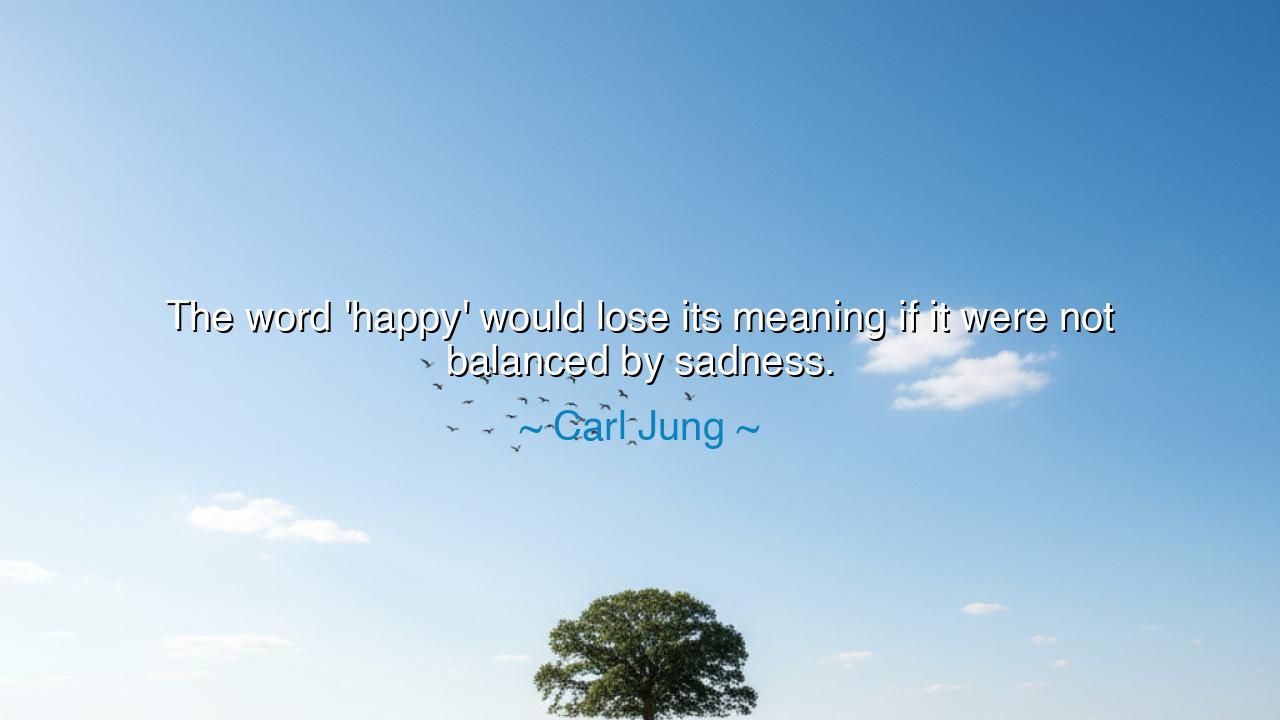
The word 'happy' would lose its meaning if it were not balanced






The great psychologist and philosopher Carl Jung once said, “The word ‘happy’ would lose its meaning if it were not balanced by sadness.” Within this brief statement lies an eternal law — the law of duality, that all light exists because of darkness, that all joy draws its meaning from sorrow. Jung, who spent his life studying the depths of the human soul, knew that happiness cannot stand alone. Without its shadow, it becomes hollow, tasteless, and unreal. The ancients understood this too: that opposites define one another, and that the heart must walk through both sunshine and storm to know the fullness of life.
To say that happiness depends upon sadness is not to glorify pain, but to acknowledge that contrast gives life its depth. Just as day has no meaning without night, and spring cannot be cherished without the memory of winter, so too does joy need the echo of sorrow to make it sacred. Jung’s insight reminds us that the human soul is a balance, a vessel that must hold both delight and despair in harmony. Those who seek to banish sadness entirely rob themselves of the very thing that makes happiness pure. The wise, therefore, do not flee sorrow — they accept it, knowing it sharpens the flavor of joy.
The ancients told stories of this truth through myth and poetry. Consider the tale of Demeter and Persephone, the goddess of harvest and her daughter, who was taken to the underworld. When Persephone was gone, the world turned barren — Demeter wept, and winter came. But when her daughter returned, spring blossomed anew. Thus, even the earth itself was bound to this rhythm — loss and return, grief and renewal. Without the winter of sorrow, spring’s beauty could not be felt. Jung’s wisdom lives in this old myth: happiness is not the denial of pain, but the cycle that follows it, born anew from understanding and endurance.
There is also a lesson in the lives of real people — those who have known despair and yet found meaning beyond it. Think of Helen Keller, who lost her sight and hearing as a child, yet came to speak of joy with a brilliance few could match. Her happiness was not naive or shallow; it was forged through struggle, through the darkness of isolation and the light of understanding. She once said, “We could never learn to be brave and patient if there were only joy in the world.” In this, her soul resonated with Jung’s teaching — that the contrast between sorrow and joy gives birth to wisdom and strength.
Jung also spoke as one who understood the nature of the psyche — that we are made whole not by denying our shadows, but by integrating them. To repress sadness is to fracture the self; to face it is to heal. When we allow ourselves to feel deeply — to grieve, to ache, to lose — we prepare the heart to receive joy more fully when it returns. The ancient philosophers would have called this the path of harmony, where opposites are not enemies but partners in the dance of existence. The rain and the sun together bring forth the harvest; so too do tears and laughter together bring forth understanding.
There is a quiet power in this teaching. It tells us that sorrow, though bitter, is not meaningless. Every heart that has been broken gains compassion; every tear shed clears the vision of the soul. To live without sadness would be to live without empathy, without gratitude, without depth. Happiness draws its sweetness from the memory of pain overcome, and sadness draws its dignity from the knowledge that it will one day pass. The two are bound together like the inhale and exhale of life itself.
So, the lesson to carry forward is this: embrace both your light and your shadow. When joy comes, welcome it with open arms, but when sadness arrives, do not curse it. Sit with it. Learn from it. Let it carve wisdom into your heart. For every sorrow endured makes happiness richer, more honest, more alive. The ancients would say that only those who have walked through darkness truly understand the value of the dawn.
Therefore, live not as one who seeks endless happiness, but as one who seeks wholeness. Accept that both pain and joy are teachers, and that together they shape the soul into something radiant and wise. For in the end, as Carl Jung reminds us, happiness has no meaning without sadness — and it is in their delicate balance that the human spirit finds its deepest truth.






AAdministratorAdministrator
Welcome, honored guests. Please leave a comment, we will respond soon